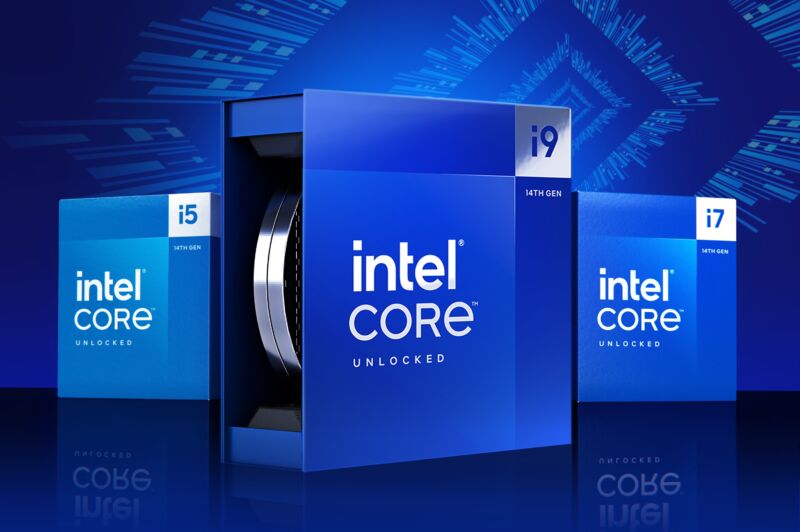
Intel
Intel has shared more about the voltage issues affecting some 13th and 14th Gen Core processors, as the company tries to put the episode behind it. As reported by Tom HardwareIntel says the issue is caused by “high operating voltages” caused by “incorrect voltage requests,” specifically increasing the minimum operating voltage of the chips. These “high voltage events can accumulate over time,” eventually damaging the processor and causing the system to freeze or crash.
Intel has developed a microcode update to fix these high voltage requests, but the bad news for some users is that they will need to update the BIOS, and it can’t be rolled out via software updates like some microcode fixes.
Intel says that in most cases, CPU performance won’t be affected by the patch, though the company did note a number of subpar results in benchmarks and individual games that showed “moderate” slowdowns (though we don’t know how much of a slowdown that is, in practice). Here’s the relevant statement on performance:
Intel’s internal testing – using Intel’s default settings – indicates that the performance impact is within run-to-run variability (e.g. 3DMark: Timespy, WebXPRT 4, Cinebench R24, Blender 4.2.0) with some subtests showing moderate effects (WebXPRT Online Homework; PugetBench GPU Effects Score). For the gaming workloads tested, performance was also within run-to-run variability (e.g. Cyberpunk 2077, Shadow of the Tomb Raider, Total War: Warhammer III – Mirrors of Madness) with one exception showing a slightly larger impact (Hitman 3: Dartmoor). However, system performance is dependent on configuration and many other factors.
For some computers, especially pre-built models, BIOS updates can be delivered via Windows Update or the OEM’s update program (Lenovo Vantage, Dell Support Programthe HP Support Assistantand MyASUS App For other devices, especially small or home-built PCs, you may need to go to your motherboard manufacturer’s website, search for your model, and download and install the BIOS update manually.
Some motherboard manufacturers have already released updates for some of their boards; MSI and Asrock Updates have been released for most motherboards with the 700 series chipset, and Asus has also Are there any beta updates available? For some 700 series motherboards. Updates for slightly older 600 series motherboards that also support 13th and 14th generation CPUs should follow at a later date. If the release notes mention microcode 0x129, you’re getting the update.
It is important to apply the fix as soon as possible, because damage to the CPU caused by voltage is irreparable. Once you notice freezes and crashes, your CPU has already suffered irreparable damage, and you will need to replace it or replace it with a new one.
If you need to do this, the good news is that Intel is offering an additional two years of warranty service to buyers of affected CPUs, for a total of five years of coverage. People who bought CPUs in retail boxes to install in PCs they built themselves can contact Intel directly; people who bought one of the chips as part of a pre-built system should be able to get the same level of coverage from the company that made the PC.
Affected processors include all Core i5, i7, and i9 processors from the K, KF, and KS series in the 13th and 14th Gen Core processor families, as well as non-K series Core i7 and Core i9 processors (despite the name change, all chips are based on the same Raptor Lake architecture). Lower-cost Core i5 and Core i3 processors are not affected, as are all 12th Gen Core processors.
Earlier this year, Intel also tried to mitigate the problem by asking motherboard manufacturers to stick to Intel’s default power settings in their BIOS settings. While these settings weren’t the primary cause of the crashes, the high voltage settings or power limits used by some of these motherboards could exacerbate or accelerate the problem.
Intel’s efforts continue. Earlier this month, the company announced that it was working on a way for users to test whether their CPUs have been damaged. The company also confirmed in its statement today that Intel is still looking into other potential solutions.
“Intel is continuing to investigate measures to mitigate scenarios that could lead to a Vmin shift in 13th and 14th Gen Intel Core desktop processors,” the statement read. “Intel will provide updates by the end of August.”

“Freelance web ninja. Wannabe communicator. Amateur tv aficionado. Twitter practitioner. Extreme music evangelist. Internet fanatic.”
